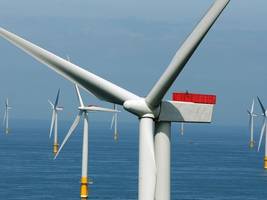 Offshore wind farms are OK after all, exciting new research by scientists has revealed, because barnacles.
Offshore wind farms are OK after all, exciting new research by scientists has revealed, because barnacles.Up until now, offshore wind farms had been widely considered by many experts to be about the most pointlessly extravagant and inefficient form of energy generation short of paying Olympic athlete Mo Farah £1 million an hour to run inside a giant, jewel-encrusted hamster wheel attached to a turbine.
Besides being wildly expensive (so heavily subsidised by compulsory levies that they cost six times more than coal energy) they are also: shortlived (because it's hard to erect such large mechanical structures in such hostile terrain); subject to declining efficiency; they kill an average 110-330 birds per turbine per year; they blight the view from the coast; they disrupt shipping; they kill whales and other marine life; they drive up energy prices; they increase fuel poverty; they enrich rent-seekers; they require vast pylons to carry their costly, intermittent energy from the sea across the land.
Happily, all these disadvantages have been nullified by this glorious news, as recounted in Christian Science Monitor:
No one doubts that the rotating turbines of offshore wind farms can hazardous to avian life, and that the devices’ constant whine can scare off some marine mammals from traditional habitat.
Now there’s new evidence that at least some sea life can actually benefit from these structures. Researchers from Britain, the Netherlands and the United States report in the new issue of Current Biology that wind farms can be rich sources of the foods that sustain harbor seals.
The report says the team studied wind farms in the North Sea and found that they serve as artificial reefs that become bases for barnacles and other crustaceans. These crustaceans, in turn, attract hungry fish, which in turn attract hungry seals.
Great. Some of my more sharp-eyed readers may have noticed that in reporting this joyous discovery I've got my snark dial turned up to 11.
Seriously, though: what was this journalist thinking? And what, for that matter, were all the other journalists and scientists he links to in that article thinking?
Get this: there is no global shortage of barnacles. (Ask any boat yard; ask any whale, for that matter). Nor is it as though, before offshore wind farms came along, the world's Pinniped population spent the first 15 million years of their time on earth cruising the world's oceans going "Crikey, it's hard finding stuff to eat. If only humans could evolve to the point where they were capable of filling the seas with 700 foot high structures with spinning blades on top so that then, maybe, barnacles could grow on the bottom attracting fish and stuff - then we'd be sorted."
Seriously not. Which is why I do worry, rather, about the mental abilities of the people who churn out this unthinking guff in order to justify the wholly unjustifiable.
When they write it, does it really never occur to them that what they're doing is the equivalent of beginning a piece on the rise of Mussolini:
"Sometimes Fascism gets a bum rap, but for rail enthusiasts disappointed by Italy's formerly unimpressive timetable efficiency record we have some excellent news...."
Apparently not. Reported by Breitbart 11 hours ago.